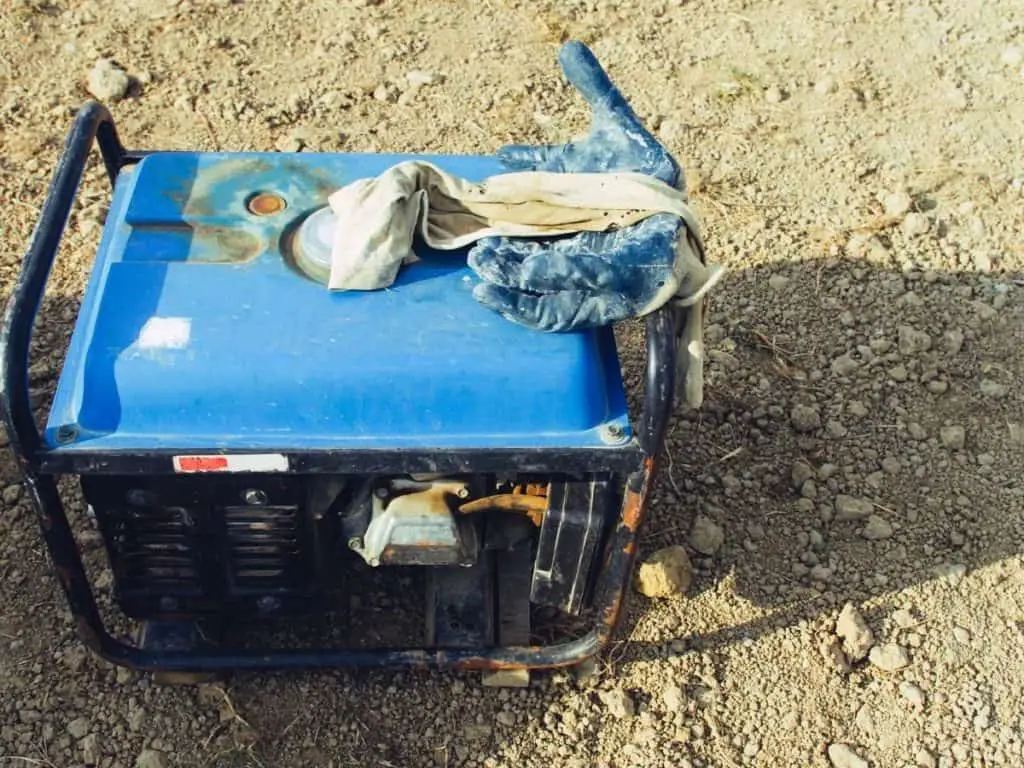Generators need to be ready to run within the shortest time possible in the event of a power outage. Maintaining the generator in a state of readiness can be of critical importance in a natural disaster that invariably results in power supply disruptions.
Having gasoline or diesel available in a clean useable format is essential to fire up the generator when needed.
- The best practice to keep a generator stored during long periods on standby is to keep the fuel tank full.
- Allow only a small amount of air at the filler cap to allow for expansion and contraction of the fuel.
- The fuel should be chemically stabilized to reduce oxidation.
When preparing your gasoline or diesel-powered generator for storage, you have to consider the state of readiness for when it is next needed.
It would help if you got the generator started and running smoothly to power your critical appliances in case of a power outage. Let’s look at the best methods of preparation for storage?

Should Your Generator Be Ready To Work During Storage?
Your generator must be maintained, fueled, and ready to start-up in the shortest possible time when a power outage occurs. You should test your generator monthly and let it run for while under load. Shut off the fuel supply valve and let the generator run dry. Top off with fresh fuel.
Power outages often result in traffic chaos and long lines at the gas stations buying up fuel for their generators and vehicles. The supply disruptions often result in fuel shortages at such times. It is important to keep a strategic fuel supply to take care of your needs during power outages.
Gas and Diesel
Both gasoline and diesel need to be treated and stored correctly to remain useful after a long period of storage. Fuel will naturally oxidize when in contact with air and will deteriorate over time. The flammability of fuel adds an additional element of risk to long-term storage.
You should store your fuel far away from your house in a cool and dry environment. Whether you are keeping the fuel in a jerry can or in the fuel tank of your generator is immaterial. The best practice is to store the fuel in the generator fuel tank filled up to the maximum level indicator.
Power outage
During a power outage, you do not want to be pouring fuel into the generator fuel tank in the dark. When shutting down the generator, do so by turning off the fuel supply valve and letting the engine run out of fuel.
Now fill the fuel tank up to its maximum, leaving only a little air between the fuel and the fuel cap. This procedure will ensure that all the fuel will be drained from the fuel lines and the carburetor leaving nothing behind that can deteriorate and contaminate the engine.
- The fuel in the fuel tank has minimal exposure to air and will thus not attract moisture or oxidize.
Check the oil level and the condition of the spark plug on the generator. Also, make sure that the air filter membrane is clean. Your objective must be to open the fuel supply valve and get the generator started with as little effort as possible when it is needed.
Struggling to get a generator started in the middle of a blackout must be avoided at all costs.
What Are The Benefit Of Storing The Generator Fueled Up?
Generators are designed for use when the power grid goes down or when you are working in a location where grid power is unavailable.
As most generators are powered by a fuel source such as gasoline, diesel, or propane gas, these fuel sources must be handled safely as they present the risk of fire and explosion.
Transporting a generator is best done with the fuel tank empty. The road vibration can cause the generator fuel tank to leak out of the fuel cap and breather hose. The leaked fuel will pose a fire risk during transport. Long-term storage and readiness for use is another matter.
Always have your generator prepared and ready to start within the shortest possible period when it is needed. Although a full tank of fuel in the generator poses a fire risk, this risk is no bigger than storing the fuel in a jerry can.
- Whether stored in the generator fuel tank or a storage container, the risk of fuel contamination and deterioration is the same.
When the generator fuel tank is filled, and the fuel supply valve is turned off, the storage condition of the fuel is similar to when the fuel is stored in a separate container. The advantage of keeping the fuel in the generator is that it can be started as soon as the fuel valve is opened.
When a power outage occurs, the last thing you want to do is run out to get fuel for the generator and try to pour fuel into the fuel tank in the dark.
The risk of fire or fuel deterioration is the same whether you are storing the fuel in the generator or a separate fuel storage container.
How To Prepare Fuel For Storaging Your Generator?
You are allowed to store a maximum of thirty liters of fuel without requiring special permission. Store the thirty liters in three separate jerry cans to prevent large voids in the containers when fuel has been poured out. Buy fuel storage additives to extend the shelf life of the fuel.
Large volumes of air in the fuel tank or container will allow the moisture in the air to condense and contaminate the fuel. Fuel additives can also be purchased and added to the fuel that is to be stored.
These additives will ensure that no water condensation or organic growth will develop in the fuel and affect the running of the generator engine.
Store the emergency fuel reserve well away from the house and garage in a cool, dry place. Storage conditions of sixty-eight degrees Fahrenheit are ideal for gasoline to be stored for three and six months.
- Diesel can be stored for up to twelve months in these conditions before it deteriorates.
Keeping your generator fuel tank filled up to the maximum level indicator will ensure that you can get the generator operational in the shortest time possible when needed.
With the fuel level at its top, the opportunity for moisture to cause condensation and contamination is minimized.
The emergency fuel supply must be close at hand and stored safely to minimize the risk of deterioration and evaporation of the fuel during storage.
The advantage of keeping the fuel in the generator fuel tank over storage in a jerry can is that you do not need to decant the fuel into the generator in the darkness of a power outage.
References:



